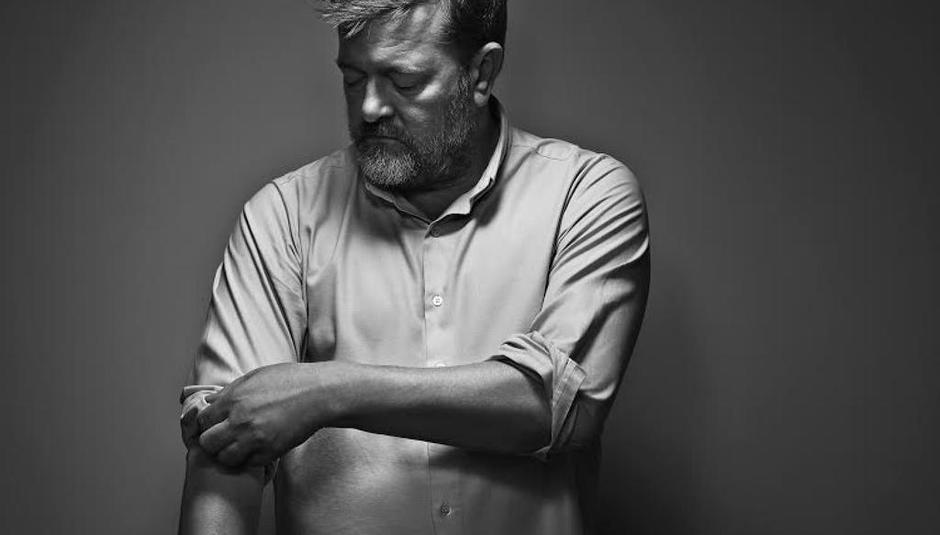"It’s just been a right fucking laugh....”
Guy Garvey doesn’t need to make a solo record. You suspect, with Elbow now firmly embedded as a British institution, that he doesn’t need to do much when he has a little bit of downtime. He always has, mind you, helping to score a musical version of King Kong, presenting the iPlayer’s Music Box and even popping up on CBeebies to read bedtime stories. It’s just that a solo record, with his name and face emblazoned on the cover, doesn’t seem very becoming of the man widely renowned as the nicest, humblest chap in indie rock, the same guy who’s long spoken of walking through Manchester and having friendly hecklers - "Elbow! Get a proper job!” - keeping him grounded.
By his own admission, he’s made this album because he knew that he had the band to fall back on if it were to go awry. It hasn’t, though; Courting the Squall is a fascinating look into the other side of Garvey’s musical sensibilities, one that anybody who’s ever tuned into his Finest Hour on BBC 6 Music will be acutely aware of, but that will inevitably come as a surprise to the casual masses of Elbow listeners who have chucked their CDs into their Tesco trolleys since The Seldom Seen Kid made the group the Mercury Prize’s biggest success story in 2008.
Everything you’ve heard about Garvey is true. He is a lovely bloke, and brilliant in conversation. I’ve barely begun to ask him about the fact that he’s off on a solo tour in December, and already he’s breathlessly running me through the band he put together for the LP. ""Danny Evans, he recorded it all. He’s worked with us for twenty-odd years, and he’s a very funny, very smart man. Nicknamed Deep Blue, after the supercomputer that beat Kasparov at chess, because of his very deep voice. Dead handy that voice, actually, because it’s the very lowest thing you can hear on the Elbow song ‘Any Day Now’. Anyway, Pete Jobson played guitar and bass - he’s in I Am Kloot, and he’s my best mate. Nathan Sudders, he’s on there, he’s become a really close friend over the past couple of years - he’s going out with an old mate of mine. The girls who make up the brass section for Elbow, they were there, and it was a good job as well, because they’ve got this sisterly vibe that breaks up the rugby-ness of a room full of men. Ben Christophers - I’ve been a fan of his for years, and as for Al Reeves, he’s just a shit hot drummer. (Elbow’s) Richard Jupp is a hard act to follow, but he was the man for the job.”
He could, you sense, go on. He’s not a fellow short of mates. He’s got such a long list of potential collaborators, in fact, that you suddenly wonder why he’s never done this sooner; as he puts it himself, the way of working on an Elbow record is always, inevitably, a rigid one, and the idea of bringing in outsiders is probably anathema.
"I’ve had this on my mind since 2005,” Garvey explains. "It was this little idea at the back of my head that came from the stuff I did producing other bands - I realised that all your work is valuable in some way, even if it’s pointing away from what you normally do. I started to put all these ideas aside; when you work with a group of people for as long as I have with Elbow, which is pretty much my whole adult life, you get to know what to expect from them in terms of what they’ll let through the gate, and I know some of the instrumental choices on this album would’ve been vetoed if I’d tried to include them on an Elbow record. They would’ve split opinion within the band.”
It’s probably going to do likewise with the listening public. That jagged, almost crude synth line on ‘Angela’s Eyes’, the flippant, almost jazzy percussive turn on ‘Harder Edges’ and ‘Electricity’s scratchy fifties throwback; they’re not going to sit well with the fairweather Elbow fans, that’s for sure, but there’ll probably be plenty of diehards, too, who have a hard time getting their heads round these tracks, at least to start with. "That’s what I want, though. It’s nice to show something a bit different. I mean, him from The National, Matt Berninger - is it Berninger of Berringer? Anyway, I’ve just heard that new collaborative record he’s done - surprisingly sugary! Some really, really cheerful pop stuff on there that I wouldn’t necessarily have known he was into. So, clearly, he’s not solely responsible for the darkness on The National’s records; it must just be the place that their tastes all meet, in the same way as melancholia and sweeping drama is where Elbow tend to land together.”
Something else that split the group down the middle was whether or not they should be involved with Courting the Squall. When Garvey rang around his bandmates to let them know what he was up to, and ask about whether or not they’d fancy helping out if they were needed, the response was a mixed one. Mark Potter, their guitarist, was well up for it; "because that’s Pot full stop, he’s a positive force for good in the world.” Bassist Pete Turner had other ideas, partly because he felt that, if Garvey was going to make his own album, he should do it properly and throw a wall up between himself and his band, and then partly because he liked the idea of Garvey touring the album so he could turn up and take the piss out of him.
"I could’ve just asked them to play the parts for me, because they’re certainly capable, but it would’ve been such a different record if that’d happened. I knew I was going to go to Real World (studios, in Bath) to do it, and I had an idea of how it was going to pan out. Ben actually asked me if I could send him some demos to help him prepare, and I didn’t have any. I just wanted to write the songs in the room, so I could play to everybody’s strengths. That’s what I did. I sang everything to the guys; I’d say "this is the bassline,” or "this the groove I want, but with a heavy snare sound.” I thought I was being dead clever, throwing all this stuff out; things like giving Ben a crazed psychedelic synth solo to learn. The joke’s on me, though, because he nailed it and he’s not coming on the road, so I’m going to have to learn it myself.”
To be fair, everything on Courting the Squall came from Garvey, even if he didn’t play it. "I was the boss. I was the chief of police, as Martin Brody says in Jaws,” he explains. That said, it still seems a touch unbefitting that he’d slap his own name on the record. "It was gonna be called Herding Cats; that’s what the folder was called on my computer where I’d been keeping all these ideas. But my manager said, "think about how many people shout Elbow at you in the street, and then think of how many shout your actual name at you in the street.” That’s already a bit of a comedown, and it’d be even more obscure if I called it something like Herding Cats. And the truth is, I’m dead proud of it. I want people to hear it.”
The same logic applied to the decision to slap a side profile of Garvey onto the cover. "Again, my manager said "people might see it and think, "that’s him who was on at the Olympics, that might be worth a listen.”” Fuck it, I thought, in for a penny and all that. I did say, though, that i didn’t want to look all ‘tortured singer-songwriter’’; that’s what solo albums always look like. I also didn’t want to look like I was coming back from a romantic all-nighter in Paris, with an undone shirt and scruffy hair - I wanted it to look like my head could go on a fucking stamp. I told them to leave all the bits in, too; I’m proud of my wrinkles, my whiskers and all those strange deposits beneath the skin. I’ve earned them.”
If it’s obvious why the general sonic template of Courting the Squall wouldn’t make the cut with Elbow - "they’re not all that into cop show brass” - it’s interesting to hear Garvey, Manchester’s poet laureate in all but name for the past decade or so, talk about the fact that a lot of the lyrical ideas on Courting the Squall were also kept apart from his work with the band. "I think it’s maybe because it’s territory I’ve covered with Elbow in a certain way,” he offers. "The band’s the great exploration; it’s the five of us playing around with music, bringing things in and developing them - just tinkering, and seeing what happens in the room. It normally takes us two years to make an Elbow record, and I did this one in nine weeks.”
"There’s a lot of stuff on the record that I’d been thinking about for a long time, but approached from a different angle. I’m talking about nest-building a lot, and starting families, because it’s something I haven’t done, but the rest of the boys have. Songs like the title track and ‘Belly of the Whale’ - I’ve had those lyrics for four-odd years. And then, there’s tracks like ‘Juggernaut’, which I didn’t even write the words to until two days before mastering. I had this great piece of music with no lyrics, but I didn’t panic. I sat in my kitchen until it happened. And I’m pleased with it.”
The title itself, meanwhile, is a classic Garvey construction job; he takes words he likes and deftly fashions them into something that holds resonance. "I’m a fan of weather words - I like the shipping forecast. The actual meaning of it comes down to the fact that we’ve all got a reckless streak in us, that rears its head at some point in our lives. It manifests itself in different ways; it might be hitting it too hard socially with the drink and drugs, it might be having a period where you don’t practice safe sex, or it might be that you start driving like a dickhead. This is all why the concept of the rebellious teenager was so appealing in the fifties, by the way; in my experience, if you tell somebody they need to slow down, they respond by speeding up. You need to find nice language to lace that conversation with, so instead of going, "fucking hell, pack it in, you’re going to hurt yourself here,” you should say, "no more courting the squall, you. No more prodding the bear, no more flirting with danger.” The verses were written to a reckless mate, and it’s stuck with me.”
He’ll be on road with a few more of his mates in December. The ones he normally shares a stage with will be in the crowd; Turner, he says, rearranged his holidays so he could be there. At venues like the Albert Hall in Manchester, where Garvey’s sold out two nights and where the balcony overhangs the stage, it might prove dangerous. "It’s going to be absolutely piss funny, innit? The thing is, I’ve got a microphone, and they’ve not, so they know what’s going to happen if they try anything. Actually, without giving anything away, there might be one of Elbow on stage with me yet, and Pot’s going to be supporting; he’s formed this blues band, The Plumedores, and they’re just fucking brilliant. They’re a three-piece bluegrass outfit, and they sound like J.J. Cale with a valve drum machine turned up to fuck. Bloody marvelous.”
You get the impression that the whole thing’s represented a weird learning curve for Garvey; he’s gotten used to, as he puts it, "working without a sounding board” whilst simultaneously getting the chance to employ skills he’d already developed away from the band ("I’ve produced other people’s records, and I know how to keep a session moving.”) More than anything, though, the making of Courting the Squall sounds like it was a riot - and it shows. "Every day at five o’clock, wherever we were up to, it was "right, you lot - pub.”
"Every step of the way, it’s been an absolute hoot, and I’m so glad I did it. I had a narrow window, really, because I was always going to be going off to Scotland with the Elbow boys in January to start writing, and I think I spent the time well. I was sitting around with Jobson the other day, and I said, "fucking hell! We’re going on Jools Holland next week! We’re going to be on telly together!” And we were both laughing our heads off, because the only other things we’ve ever really done together is sit in the pub or pour each other into taxis. So, yeah. Fucking ace.”
Courting the Squall is available now via Polydor. Guy Garvey tours the UK in December























